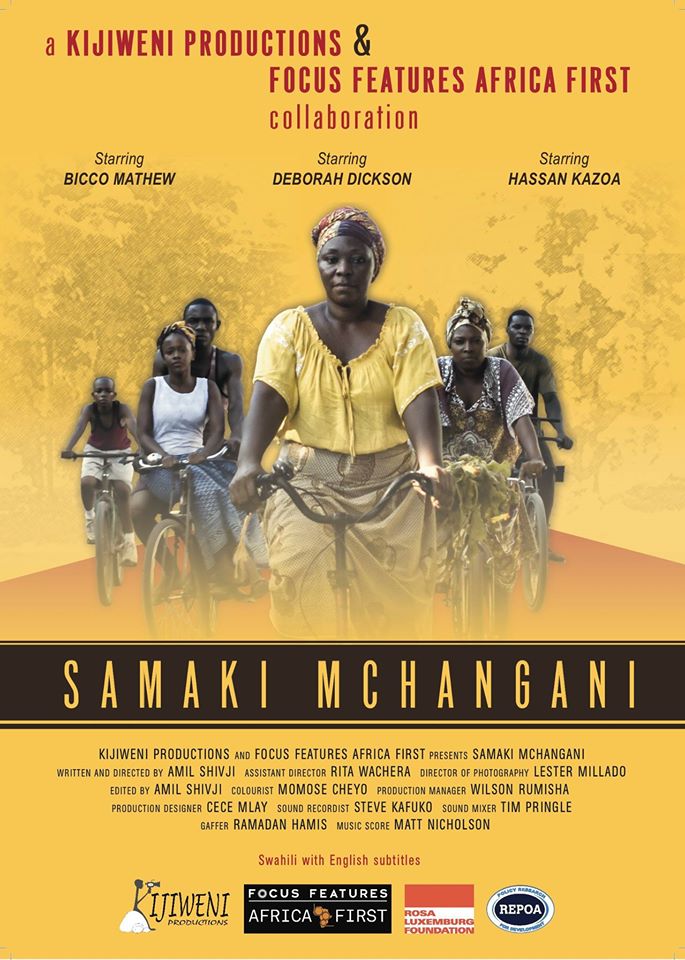Not too long ago, Vijana FM interviewed the founder of Kijiweni Productions, Amil Shivji, on his short film Shoeshine. Today, a new short film by Kijiweni Productions was launched, Samaki Mchangani. Here’s our discussion on the newest release.
1. Samaki Mchangani just launched today. Can you give any hints to the public about its plot?
Samaki Mchangani (Fish of the Land) is a 30min film that was one of the winners of the 2013 Focus Features Africa First grant. It starts with Godfrey Kitinga, a young Tanzanian entrepreneur and son of a parliamentarian (hint hint) who opens the first Tanzanian owned cellular company. Proud of his achievement in taking a huge step for Tanzanian development, disaster strikes when he gets into an accident on his way home with a fish seller – Mama Aisha. Certain decisions have to be made which lead to certain consequences. The film plays on the mind of the ever so entrepreneurial Tanzanian who is willing to go to extreme lengths ‘develop’ himself.
2. What was your primary motivation in writing this film?
When I was writing the script there was a particular topic that was bugging me a lot, and still does – this ‘Africa rising’ phenomenon that either has us sifting through our chairs in discomfort or falling over in excitement at the idea of ‘opportunity’. Magazines, newspapers, blogs, TV shows I mean you name it, everyone was talking about GDP, economic statistics, growth rates, African development bank so on so forth. But who is it rising for? When you compare these statistics to the growing unemployment rates, increase in land grabs and consequent displacement of people, Tanzanian people for so-called foreign and local investment its appalling! Is Africa really rising? Are we substituting human value for steeper graphs? And on whose backs is it rising on? Who is been factor from this ‘growth’? Art is a mouthpiece and form of expression and release for many, these are questions I try to address in the film.
3. Compared to your last film, Shoeshine, what was different in terms of producing/making the film?
I think Shoeshine and Samaki Mchangani are quite different films that tackle similar issues in regards to offering a voice that has too often been drowned out. The new film is a more of a thriller and personally I think is more powerful in its story telling technique. I had some of the old cadres from Shoeshine and some new faces as well, it was wonderful to mix the team up and once again produce a piece of work I can proudly call a Kijiweni Production. The new film is much more ambitious in terms of production value, we shot in more locations and had a bigger production team. It was a challenge but then again no film is easy to make.
4. In your opinion, is Tanzania’s film industry or its audience changing since you started work on Shoeshine? How so?
I think the film sector is changing by the day. Constantly there are new faces on the scene and I always hear about new projects, exciting ones. The problem arises in implementation and rushing towards the market to breakeven days after production ends. We need to emphasize qualitative production but also appropriate distribution methods in order to change audience perception. Most Tanzanians who have watched shoeshine have liked it and have even embraced the idea of short films, a new concept in the Tanzanian film sector. However, there is still a lot of work to do and I am hoping this time to hit the market as well in order to get a larger audience.
5. What would you advise the aspiring any media producer to do: Follow conventional standards and get quick praise, or go uphill and make your own path? Why?
Go uphill and make your own path for sure! I say this not as an approach to every corner of life but because in the film sector in Tanzania we are lacking structure and genres. Space for innovation is infinite so why on earth would we want to play safe. As an artist you need. To leave your print in your work, a certain aesthetic that defines you. Best thing is you probably won’t even realize it someone else might be the one who catches it. It’s very important to carve your own path while respecting the work of others and collaborating with fellow artists and filmmakers.
Related links:
- Kijiweni Productions homepage | Facebook | Twitter
- Kijiweni on YouTube
- Focus Features Africa First
- Samaki Mchangani Teaser | Poster
- Previous interview with Amil on Vijana FM



[poster script]
Kijiweni Productions and Focus Features Africa First present Samaki Mchangani.
Written and directed by Amil Shivji
Assistant director: Rita Wachera
Director of photography: Lester Millado
Edited by Amil Shivji
Colourist: Momose Cheyo
Production manager: Wilson Rumisha
Production design: Cece Mlay
Sound recordist: Steve Kafuko
Sound mixer: Tim Pringle
Gaffer: Ramadan Hamis
Music score: Matt Nicholson
Swahili with English subtitles.